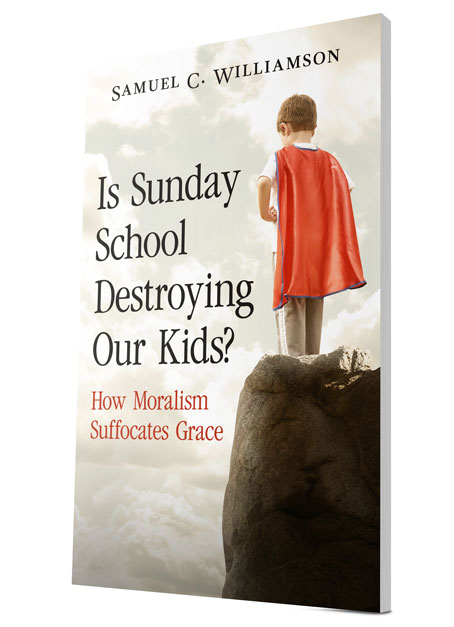I went to school with a young woman who scratched little marks inside her Bible to keep score of how many people she had converted. She showed me her totals every few months. I can still see those little tally marks, just like WWII pilots scratched their kills on the nose of their bombers. She claimed about thirty-five.

She really did talk constantly about God, in almost every conversation, but I doubted her tallies.
Because she also scolded boys for hair that was too long and girls for skirts that were too short. She disdained dancing or going to movies on Sundays (she probably never went to movies). She hated smoking, drinking, and cussing; and she once chewed me out for saying, “Heck!”
My friend was the spitting image of a moralist, though I’m pretty sure she shunned spitters too.
It’s Not What We Think
A friend of mine rejected Christianity (while in seminary!) precisely because of such rigid rules. While he didn’t smoke or cuss (and rarely drank even a Bud Lite), he also didn’t lecture anyone who did. His highest good was the golden rule: Treat others as you wish they would treat you.
He was far more fun to have coffee with than my moralist friend. Yes, he did try to convert me to his way of thinking, but I doubt he scratched kills inside his copy of the Humanist Manifesto. My atheist friend felt all those fundamentalist rules were just ugly.
I understand his feelings. When we see Pharisees in the Gospels, aren’t they the most unattractive group of people in the Bible? Like the turtle story, it’s ugliness all the way down, from the stoning of the adulteress (and not the adulterer) to the arrogant superiority of the hypocritical prayer, “I thank you God that I’m not like other people….”
(But in our flashes of honestly, don’t we secretly pray, “I thank you God that I’m not like them”?)
Every culture has its own sense of “pretty” and “ugly” morality. In Jesus’ day, the idea of loving your enemy was stomach-turning, but the idea is celebrated today. Back then, the Pharisees were praised for their purity, but today they are the scum of the Scriptures.
It’s Where We Get Life
My moralist friend from high school believed we are saved through faith not through works. Her theology was good, but she felt the best about herself only when she was working her tail off. Nothing gave her more joy than scratching one more victory inside the flap of her Bible.
Her inner life was fueled by her doing. And whatever gives us the most life is our real salvation, no matter what theology we think we believe.
The real sin of the Pharisees was not their rigid rules (many of which were biblical), it was their self-adulation for keeping them. We all tend to keep the rules we most like, because we want to feel good about ourselves. We love to think, “I’m the kind of person who would never _________ (fill in the blank).” Which is self-praise for our “pretty” morality.
What makes people pharisaical isn’t the prettiness or ugliness of the rules. Moralism is pride in our morals and disdain for everyone else’s. That means even the most libertarian, freedom-loving people can be devout Pharisees. It certainly means we are. It’s why we always choose morals that are attractive to us. So we can keep them and feel good. Proud even.
The scriptural standard of morality is always something beyond our reach. The conservative moralist may have difficulty with pride, and the secular libertarian may have trouble with biblical sexuality. It’s not the pretty rules we reject, it’s the rules we simply don’t like. Biblical morality makes us cry for help.
Instead of scratching victory marks on the flaps of books, let’s scratch beneath the surface of our self-esteem-building morality.
Sam
++++++++++++++++++
For more essays on moralism, read my book, Is Sunday School Destroying Our Kids.
People in the world often reject Christianity simply because they can’t distinguish it from mere morality.
The world needs morality–oppression thrives when consciences are abandoned–but we need more than morality alone. We need the gospel of grace. A gospel that has largely been lost amid the dos and don’ts and preoccupations of religious culture.
Join thousand of other readers who have delighted in this short, story-filled, thought-provoking book on grace.
[button href=”http://www.amazon.com/Sunday-School-Destroying-Our-Kids-ebook/dp/B00H5C7GB2/ref=sr_1_1?s=books&ie=UTF8&qid=1455706442&sr=1-1&keywords=is+sunday+school+destroying+our+kids” primary=”true” centered=”true” newwindow=”true”]Buy now: Is Sunday School Destroying Our Kids?[/button]


 Warming Up to the Resurrection
Warming Up to the Resurrection
Sam, thank you for your articles, they often cause me to “scratch” below the surface of what I think and believe. Morality, to me has been a vague topic. Brought up catholic, I was well trained to see everything and one in terms of black and white. Guess what ? I lived in the GREY zone most of my life. I am 71 at present and often reflect on my days gone by [something many older folks do]. As I view in my mind and soul the experiences I have been through, one thing stands out. When I look at the world around me, am I focused on what I see that is moral and then decide who is and who isn’t ? Why ? To lift myself up to a level that I am not, to pursue my observations and criticize other’s lack of morality ? My conclusion is this is definitely NOT in the image and likeness of the one I follow – Jesus Christ.
Thank you again Sam for helping me look deeper into my reflect of self and life. Len Wisniewski – Tucson Arizona- [email protected]
Hi Leonard,
You nailed it when you say we look at morality “to lift ourselves up to a level that we aren’t.” Alas.
What we need more than self-esteem is God-esteem, knowing the truth of his love that cost his son. If we’ve got that, we can admit our dismal failure to live up to his morals.
Sam,
I’m just glad that this blog was written for your other readers and not me!
Signed,
A Pharisee
“And whatever gives us the most life is our real salvation.” That is just inspired.
Is my life-force in Jesus? Is it in the good stuff I do? Resentment has been suffocating me lately. I wonder if my rage is connected with my beliefs that I am better than that person? I’ve felt blocked in service because I feel that the person doesn’t deserve my service. How self-righteous is that? Haha.
Thanks Sam for putting your finger on the nerve.
Hello Havs,
So good to hear from you!
I like your phrasing, “Is my life-force in Jesus?”
You know, of course, that the problem with writing an article like this is that I so don’t want to be like that person … which makes me that person.
But God can overcome all, right?
I just bust out laughing. Thank you.
From one Pharisee to another.
Okay, that was awesome!
One major advantage of having tried to live a holy life was the discovery that I am not holy. I need the righteousness that comes from Jesus. If only the lesson always stuck!
I suspect we need two things to discover our unholiness:
– First we need to try our hardest to be holy
– Second, we need to be honest with ourselves
And we’ll realize our absolute need for a savior.
Isn’t that the real point of the Sermon on the Mount? Jesus says that sin isn’t just murder but the anger (or lust, or greed, or judgment, etc.).
In a certain sense, I want to say, “God save me from the Sermon on the Mount!” (Which is God’s point: we need a savior more than an example.)
Wow, very good one.
I was one of those, once, who thought “good that I am not like those” But this changed, after I became the “prodigal son” at the end of high school. I was asked to stand up in class in front of everyone by our history teacher and asked if I really believed the bible. You see, I was arguing with her before about this topic. And the bell rang, nobody heard, but I heard, I said “no”. Actually I did believe, but was so afraid of other ppls opinions. After that I felt litterally God going away…the most terrible feeling of all. And as much as I begged, He did not return. So about 6 or 7 years I lived as a non christian. Not by choice but because I was not able make any right decisions without God. So I sinned in every aspect, like no other. And when God finally found me again. He brought into my knowledge all my sins and I asked for forgiveness. It was about 6 years ago. When I look back, I can see that, even though it did not have to go like that, it was actually good, since it showed me that all those sins everyone is capable of, I am also capable of doing. It also really showed me that every good thing we do is through Him. So the glory can only go to Him. I like how J Meyer puts it. “God does not do things thanks to us, but in spite of us”
So I went from being the brother (sister) of the prodigal son, to being the returned prodigal son (daughter) who is aware of his (her) sins.
Chris,
One of the (many) reasons I like your comments is that you are always so honest in your sharing.
I think we all waver between being the older brother (or sister) and the younger.
You story ends where it should for all of us: being the returned prodigal.
Hi Sam – great post on the standards Christians may have, which resemble a menu at a Chinese Restaurant. LOL . It is so true that many Christians, even those who believe that it was “God’s Grace” which saved us, are now stuck in judgement and their own performance mentality. This can also result in their inability to forgive themselves for their “Falling Shorts”. That self-unforgiveness can result in the manifestation of “Autoimmune disorders”, which they then construe as “God’s Punishment” on themselves for failure to meet His standards (at least, those which they, themselves proclaim).
If you are still in touch with the old friends you mentioned, I would appreciate your recommending my book …. (as you know from readiong the pre-publication copy) it is all about recognizing who we are in Christ and how happy and forgiving He is with us… even when we don’t ask Him for it. Love you, man!
Alas, I lost contact with her after high school (I think she moved after her junior year).
But I have hope. My father once said, “All Christians go through some kind of formula phase of Christianity before finally coming to God just empty, just as they are.”
Honestly, Jack, I sometime wonder if your autoimmune approach is not a little too formulaic too. Sorry 🙂
Sam
This is so thought provoking. Thank you. It seems that many of us “saved” during the Jesus movement of the 70’s are starting to question a lot of our early teachings. Don’t get me wrong; I still believe in Jesus and all He stands for, I believe in salvation by grace, God’s unconditional love, His Word and his Gospel. But something has changed. Some of us don’t even attend a church anymore, but meet in small groups. Would like to explore this trend further. Thank you.
Hi Nic,
Like I said in a comment above, almost all believers go through a formula form of Christianity at some point, so it’s no surprise the Jesus movement did as well. We begin in the Spirit and then turn to the flesh.
But we don’t have to end there!
Sam